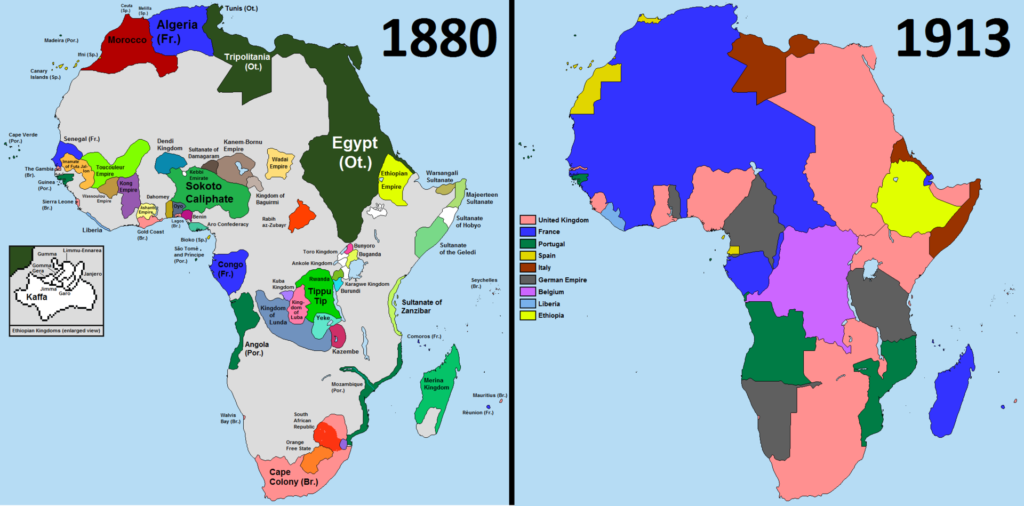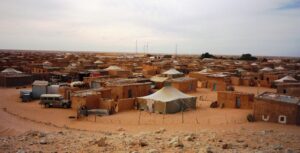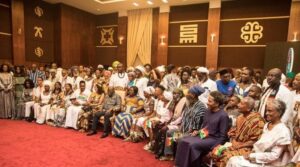❈ ❈ ❈
Mali, Guinea, Burkina Faso
Ian Beddowes
At the recent US-Africa Summit held in December 2022, a number of countries were not invited: Eritrea voted against the UN resolution condemning Russia for defending the Donbass, Somaliland is not internationally recognised, the Saharawi Arab Democratic Republic has the greater part of its territory occupied by Morocco, a close US ally.
Then Mali, Guinea and Burkina Faso were excluded. These three have a lot in common. All three are former French colonies which recently had military coups supported by their people and have now excluded both the French and the US from their territories.
The common perception is that if a military coup removes a government elected through the ballot box that this must be bad thing.
Well! In most cases it is. But not in all cases.
If a foreign power which controls the economy of your country and also controls the election machinery is that a democracy?
Western countries and the Economic Community of West African States (ECOWAS) have condemned the miliary coup in Mali which took place in 2020 and the second ‘coup within a coup’ which took place in May 2021 and saw coup leader, Colonel Assimi Goita, assume the position of interim President of the Republic of Mali. But even Western news agencies are finding it difficult to suppress the fact that the coup government has widespread popular support. A report from the government-backed United States Institute of Peace says:
“Malians are so exhausted with instability and graft, they’re willing to give military leaders — thus far free of the taint of corruption — an opportunity to address the country’s longstanding challenges.”
In Guinea on 5th September 2021, Lieutenant-Colonel Mamady Doumbouya seized control of state television and declared that President Alpha Conde’s government had been dissolved and the nation’s borders closed. Conde was 83 years old and was to stand for a third term and had won an election marked by violence and fraud.
Now in Burkina Faso, a coup has placed Lieutenant-Colonel Paul-Henri Sandaogo Damiba as interim President. The coup brought jubilation in Burkinabe capital Ouagadougou with people holding pictures of Malian leader Assim Goita and assassinated former Burkinabe President Tomas Sankara.
What is interesting here is how western countries are selective about which coups they call democratic and which they support!
Immediately after the coup against Tomas Sankara, his murderer, Blaise Compaore won immediate recognition. Likewise when Mali’s first President Communist-leaning Modibo Keita was removed by a coup in 1968 and replaced by the French-backed dictator Moussa Traore who was to be in power from 1968-1991, there was no outcry.
In Guinea, its first President Ahmed Sekou Toure demanded immediate independence from France in 1958 without any remaining control by France. When the French pulled out, they sabotaged everything. They left no money in the government bank account. They destroyed all records and they physically destroyed most of the infrastructure as a lesson to all other colonies which might demand full independence.
As other countries colonised by France obtained nominal independence, the following conditions were imposed:
1. Colonial Debt for the benefits of France colonisation.
The newly ‘independent’ countries should pay for the infrastructure built by France in the country during colonisation.
2. The African countries should deposit their national monetary reserves into French Central Bank.
The monetary policy governing such a diverse aggregation of countries is /operated by the French Treasury. Under the terms of the Central Bank of each African country is obliged to keep at least 65% of its foreign exchange reserves in an “operations account” held at the French Treasury, as well as another 20% to cover financial liabilities.
More than 80% of the foreign reserves of these African countries are deposited in the “operations accounts” controlled by the French Treasury. The two CFA banks (which control currency, one for West Africa, one for Central Africa) are African in name, but have no monetary policies of their own. The countries themselves do not know, nor are they told, how much of the pool of foreign reserves held by the French Treasury.
It is estimated that France is holding close to US$ 500 billion of African countries money in its treasury.
France allows their African colonies to access only 15% of the money in any given year. If they need more than that, they have to borrow the extra money from their own 65% from the French Treasury at commercial rates.
In March 2008, former French President Jacques Chirac said: “Without Africa, France will slide down into the rank of a third [world] power” Chirac’s predecessor François Mitterand already prophesied in 1957 that: “Without Africa, France will have no history in the 21st century”
3. Right of first refusal on any raw or natural resource discovered in the country.
France has the first right to buy any natural resources found in the land of its colonies
4. Priority to French interests and companies in public procurement and public building.
5. Exclusive right of France to supply military equipment and military officers.
6. Right for France to pre-deploy troops and intervene military in the country to defend its interests.
7. Obligation to make French the official language of the country and the language for education.
7 out of the 10 most illiterate countries in the world are among these Francophone African countries.
This includes Guinea, Chad and Burkina Faso. All have under 50% literacy.
8. Obligation to use France colonial money, the CFA Franc.
9. Obligation to send France annual balance and reserve report.
Without the report, no money. Reports are audited by the Central Bank of France and the French Treasury.
10. No military alliance with any other country unless authorised by France.
11. Obligation to ally with France in any situation of war or global crisis.
Africans are obliged to fight for France.
We can no longer agree to the military occupation of Africa and the syphoning of African wealth by other countries. France must leave Africa permanently.
The majority of ECOWAS countries and a large number of countries in the African Union are in reality French colonies under French control. No wonder that these organisations are either ineffective or worse — organs of neo-colonial control.
Further, the jihadist insurgency in the region began after NATO armed al Qaeda in Libya during the bombing and destruction of that country. After that, including the genocide against black Libyans, these forces moved south.
We know too that there is so much corruption in Ukraine that weapons sent to Ukraine by Western countries are frequently ending up in this region. Of course that then gives the excuse for US and French forces to go in as part of their ‘War against Terror’. In these three countries, US and French forces have been expelled and the Russian Wagner Group has now been employed to give assistance.
We do not know yet how good or bad the coup governments of Mali, Guinea and Burkina Faso will be. But one thing for sure, they have weakened the parasitic hold of France and the USA on a large part of Africa and we must support them at this time.
(Courtesy: The International, a news/media platform with left ideological inclination and strongly dedicated to strengthen the voice of the oppressed people across the globe and advocates for equal opportunities and guarantee of democratic rights to one and all.)
❈ ❈ ❈
Peace Deal Between Ethiopian Government and TPLF Holds Despite Delays in Implementation; U.S. Escalates Attempts to Scapegoat Eritrea
Pavan Kulkarni
On Friday, February 3, Ethiopian Prime Minister Abiy Ahmed held the first face-to-face meeting with a delegation from the Tigray People’s Liberation Front (TPLF) since the beginning of the civil war in the country—to take stock of the progress made in implementing the peace deal signed on November 2, 2022.
The Prime Minister has reportedly decided to increase flights to and banking services in the region, which were only restored in the war-torn northernmost state of Tigray following the peace deal. The TPLF had agreed to full disarmament as part of the deal signed in South Africa capital Pretoria.
Redwan Hussien, national security advisor to the Prime Minister, said that as per Ahmed’s decision, the “National Bank [of Ethiopia] has begun sending 5 billion Birr to Mekele to be dispensed starting Monday. It’s a multifold increment from hitherto 20 million.” He further added that Ethiopian Airlines has increased the number of flights to Tigray’s capital Mekelle from three to four.
Delegates from the government and the TPLF reportedly discussed the progress made so far, and acknowledged failures in the timely implementation of the deal.
The peace agreement had brought to an end to the two-year-long civil war that began after the TPLF attacked a federal army base in Mekelle on November 3, 2020. The war expanded to neighboring states in the subsequent year when the TPLF invaded Afar and Amhara.
About 600,000 lives were reportedly lost in northern Ethiopia as a result of the civil war, which concluded with the signing of a peace deal only after the TPLF’s forces had been beaten back and encircled in Mekelle. The peace agreement “stopped an average of 1,000 deaths per day,” Olusegun Obasanjo, the African Union (AU) envoy to the Horn of Africa, who had led the peace negotiations, told the Financial Times.
TPLF’s disarmament delayed
However, implementation of key aspects of the agreement have fallen well behind schedule. The agreement had set the “the disarmament of the heavy armaments of the TPLF combatants as a matter of priority,” to be completed within 15 days of its signing. However, it was only on January 11 that the TPLF began to hand over its heavy weaponry.
The agreement included a provision to extend the 15-day deadline, if endorsed by senior commanders on both sides. However, it stipulated that “the overall disarmament of the TPLF combatants, including light weapons,” had to be completed “within 30 days from the signing of this Agreement,” that is, by December 2, 2022.
“But the TPLF are still hoarding light weapons,” historian and former Ethiopian ambassador Mohamed Hassan told Peoples Dispatch. Last Sunday, January 29, when Tigrayan protesters took to streets in Mekelle to demonstrate against the TPLF’s continued hold on political power, “well-armed groups of TPLF surrounded the city and took over key areas to stop the demonstration,” he said.
Acknowledging that there was a discussion in the meeting on February 3 over “back-logged works,” TPLF delegate Wondimu Asaminew told the Ethiopian News Agency (ENA), “we have agreed to quickly reach the goal of [the peace agreement].”
Admitting that “there is much work to be done,” Peace Minister Binalf Andualem added, “by protecting and strengthening the work done [thus far], both sides should work on the delayed issues quickly.” He also said that “there is a determination and desire on all sides that this peace agreement should never be reversed.”
In the meantime, the US, which had backed the TPLF in its war against the federal government, has been escalating its efforts to place Eritrea at the center of this conflict. Eritrea had sent troops to assist the federal Ethiopian National Defense Forces (ENDF) in defeating the TPLF, which, soon after starting the war against the Ethiopian federal government, had also fired rockets into Eritrea.
Eritrea and Ethiopia’s common interest in defeating TPLF
Eritrea and Ethiopia had a common stake in defeating the TPLF. The TPLF had in 2018 opposed the peace deal between the two countries, for which Prime Minister Ahmed was awarded the Nobel Peace Prize in 2019. The decades-long conflict between Eritrea and Ethiopia began under the TPLF’s US-backed authoritarian rule of Ethiopia (1990-2018), until it was overthrown by mass pro-democracy protests, against the backdrop of which Ahmed became Prime Minister.
Soon after taking charge, Ahmed undertook a slew of political reforms, including the release of political prisoners incarcerated by the TPLF, welcoming back political exiles, and lifting the bans on free press and on opposition political parties that had been instituted under the TPLF’s rule.
He also ended the war with Eritrea, and followed up the 2018 peace-deal with a Tripartite Agreement for peace and cooperation between Ethiopia, Eritrea, and Somalia in 2019. Threatened by the prospect of unity between the countries of the geopolitically crucial Horn of Africa, the Biden administration, which was waiting to take the White House in late 2020, instigated the TPLF to start this war in an attempt to unravel the progress made, maintains Hassan.
Throughout the war, the US, the UK, and the EU, as well as the Western media, portrayed the Ethiopian federal government, and Eritrea—which had come to its assistance—as the aggressors. Forced conscription of Tigrayan children and youth into the war as cannon fodder for human wave attacks, massacres and gang-rapes in Amhara and Afar, burning of villages, looting of hospitals and food stores, and other atrocities by the TPLF were largely ignored or understated.
This attempt to paint the Ethiopian federal government as the aggressor appears to have halted after the peace agreement, which was signed only when the TPLF was said to be on the verge of a total military defeat. However, the US continues to train its guns on Eritrea, denying the widely reported withdrawal of its troops.
10 days after the Pretoria agreement, the joint declaration by senior commanders issued in Kenyan capital Nairobi on November 12, 2022, stated:
“Disarmament of [TPLF’s] heavy weapons will be done concurrently with the withdrawal of foreign and non-ENDF forces from the region.”
On November 15, the US State Department threatened more sanctions if Eritrean troops and the militias of Amhara and Afar, which had fought alongside the ENDF, did not accordingly withdraw from Tigray.
While the TPLF began to hand over its heavy weapons only on January 11, 2023, well over a month after its full disarmament—including of light weapons—should have been completed as per the agreement, the withdrawal of Eritrean troops had already begun by December 30, 2022.
On January 15, AU envoy Olusegun Obasanjo confirmed that Eritrean troops had already withdrawn to the border. Large-scale withdrawal back into Eritrea was widely reported on January 20. In a phone call with Prime Minister Ahmed, US Secretary of State Antony Blinken also “welcomed” the “significant progress to date on implementation of the November 2 Cessation of Hostilities Agreement” including “the ongoing withdrawal of Eritrean troops from northern Ethiopia,” according to a statement by his own spokespeople.
Nevertheless, only days later, Ambassador Linda Thomas-Greenfield, US Representative to the UN, said at a press briefing in Nairobi on January 28 that the Eritrean troops “have moved back to the border and that they’ve been asked to leave Ethiopia.”
While implying that the Eritrean troops remained in Ethiopia against the wishes of the Ethiopian government, “she did not provide any evidence or source for this assessment,” Reuters reported. Later that same day, TPLF’s spokesperson Getachew Reda repeated her claim, saying that “thousands” of Eritrean troops were still present in the country.
Denying this claim, Major General Teshome Gemechu, ENDF’s Director-General of International Relations and Military Cooperation, stated that “There is no other security force in the Tigray region except the FDRE [Federal Democratic Republic of Ethiopia] Defense Forces.”
Thomas-Greenfield’s statement, aimed at sowing discord between Ethiopia and Eritrea, “is absolutely false,” Simon Tesfamariam, Eritrean activist and director of the New Africa Institute, told Peoples Dispatch. “There are agreements between the two countries extending to military cooperation. There is this desire to portray that the relation between Ethiopia and Eritrea is headed in a sour direction. But this is untrue. The cooperation between the two countries has only strengthened,” he added.
Hassan, who is also an adviser to the president of Ethiopia’s Somali regional state, concurs. “In fact, when the Eritrean troops were leaving, people in the northern part of Tigray, who were fearing a return of the TPLF, were pleading with them to stay,” he said. “But the Eritrean forces left, and the area is in control of federal troops.”
The attempts by the US and other Western countries to provoke tensions between Ethiopia and Eritrea “will not be successful because the majority of the Ethiopian people are grateful for the Eritrean army’s help in defeating the TPLF,” he said. While the US was hoping to disrupt the strengthening of relations between Ethiopia and Eritrea by instigating the TPLF into waging this war, it has only resulted in solidifying their relations further, Hassan argued.
(Courtesy: Peoples Dispatch, an international media organization with the mission of highlighting voices from people’s movements and organizations across the globe.)




